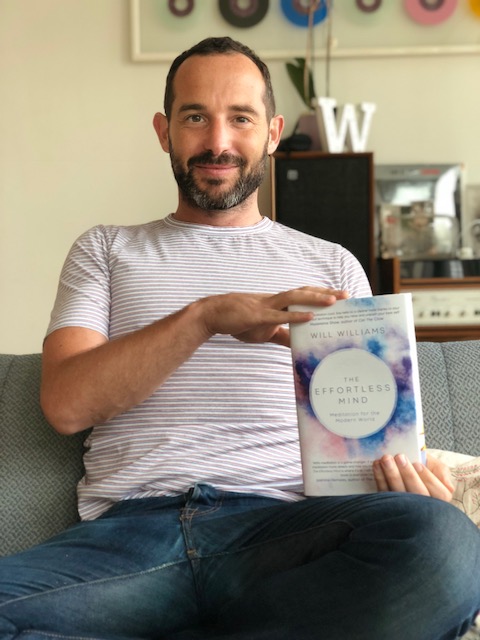Meditation is one of the most powerful things a person can do to make themselves feel more fulfilled. It’s the self-care tool that empowers you to take control of your own wellbeing, and offers a space in the day when your time is truly yours. With benefits such as less stress, greater compassion and more energy, it’s often observed that if more people practiced meditation, the world would be a significantly better place. Yet this sentiment sparks a question: why doesn’t everyone meditate, and is there anything we can do to make this practice more accessible?
Meditation and me
It was seven exhausting years of chronic insomnia – which I’d tried desperately to cure with everything from acupuncture and hypnotherapy right through to herbal sleeping tablets – that led me to Vedic meditation. I had been recommended the practice by a friend of a friend who had faced a similar struggle, and it had proved transformative for him and several of his friends, so I decided to give it a go. Within weeks it helped me to sleep soundly for the first time in years, and set me on the path that eventually made me a meditation teacher and author.
But without the motivation of several years of sleepless nights to compel me into trying meditation, would a guy like my former rock’n’roll self – pleasure-seeking and self-destructive – ever have had the inclination to try this amazing technique? Vedic meditation truly changed my life, in ways that I could never have guessed back then. But the cultural stereotype of who meditation is apparently for limited me from even considering it until I had first-hand confirmation from my friend.
Conversations I have with people about how reluctant their friends are to take up meditation, or with people in workplaces who haven’t even contemplated trying it (despite a clear need in their life) reveal to me that these stereotypes are still holding people back.
The truth of the matter is that meditation is for everyone. Sometimes, however, the way meditation is presented can mean that it doesn’t feel that way. There’s an idea that meditation is just one part of an aspirational (but rarely achievable) perfect life – one that’s filled with exotic retreats, endless free time, and tastefully designed meditation spaces within light and airy homes. Social media is full of images of beautifully glowing people leading enviable lifestyles, and it can be hard for non-meditators to imagine how this unattainable image can become part of their everyday life – in all its normal, messy, earthy busyness.
But meditation isn’t just a lifestyle accessory for a certain kind of person. While there’s absolutely nothing wrong with being spiritual, interested in wellness, affluent, or hippyish, having these attributes and attitudes isn’t a prerequisite for benefiting from meditation. You could be the most skeptical and no-nonsense person in the world, with a bunch of lively kids to bring up and a demanding job to go to, and meditation can still become an important and helpful part of your life. In fact, you would probably benefit more than most! When it comes to meditation, there simply is no “type” that this practice is limited to.
Meditation for the modern world
For me, a huge part of making meditation accessible is applying it in the context of the modern world. I’m a big proponent of the idea that it’s often the simplest techniques that are the most powerful, and a key issue with some methodologies is that they can be difficult to reconcile with the realities of modern life. Techniques developed for monks are well suited to mountaintops and ashrams, but not necessarily a fast-paced urban lifestyle.
Many of us simply don’t have the luxury of cutting ourselves off from the bustle of the everyday, and the mental energy required for certain meditation techniques is a significant barrier to continued practice. If you can make them work, then rock on. However, if you have tried and not succeeded with one of these techniques, or are put off by some of the commitments, then be assured there are easier ways to go about it.
Busy people often don’t have the bandwidth for anything too involved when it comes to meditation, which is why a practice that you can do on the tube, sitting in a cafe, or hunkered down at work is key to it becoming a regular part of your life. This needn’t go hand in hand with some kind of spiritual revolution or lifestyle overhaul, it can simply be a life enhancer if that’s all people want it for.
I’ve noticed over the years that many people are held back by the idea that we need to change everything that’s less than ideal in our lives all at once. It’s why we end up with a list of New Year’s Resolutions as long as our arm every year, and struggle to stick to any of them. Meditation is a wonderful keystone habit which often leads to further positive lifestyle change, but at first, simply including meditation in our lives is enough, and will have benefits just on its own.
The popular image of a super-healthy person who eats nothing but leafy greens and meditates for a gazillion hours a day may persist; there’s no helping that. But if all someone can fit is 25 minutes of meditation between rushing out for a takeaway burger, putting the kids to bed and collapsing in a heap, that’s still going to create a major shift for them. Rather than thinking meditation is something aspirational that we do once our lives are all sorted, we would all benefit as a society from understanding that it’s actually an everyday habit that will help us sort out our lives.
Teaching men that there’s no shame in self-care
One of the barriers to meditation (and the concept of self-care in general) is that it can be perceived as feminine – and it’s a particular hurdle to encourage men into this kind of practice. Manly men don’t need to sit down with a mantra and calm down; they can just head to the bar and watch football! But the statistics around male suicide suggest that society’s attitude towards what is “macho” are doing men no favors. In light of this, it’s critically important for men to know that taking actions to nurture their wellbeing is in no way weak or unmanly.
Meditation isn’t just for the type of person who works in an office, either. It’s wonderful how corporate wellbeing has been embraced by companies over the last few years, but there is a propensity for this to be in mainly white-collar jobs. Expanding corporate wellbeing programs into every kind of workplace could introduce people who have never really thought that much about meditation (perhaps because they are simply too busy getting on with life) to the idea, and all its benefits.
I strongly believe this is also a brilliant reason to take meditation into schools. Not as an obligatory task, but as an optional learning modality during a 15 minute dedicated quiet time program, allowing all children the time to calm down. Kids from all backgrounds and aspirations would be empowered to make meditation part of their daily lives, and there’s no telling how an early introduction to the practice could positively influence them.
With so many benefits to be gained by every individual, the wider societal impact of accessible meditation would be truly profound. And the more we embrace it as a culture, and bust the myths that put so many off, the more we will find it easier to incorporate meditation into our days – and the less of everyone’s stress we would have to deal with!


